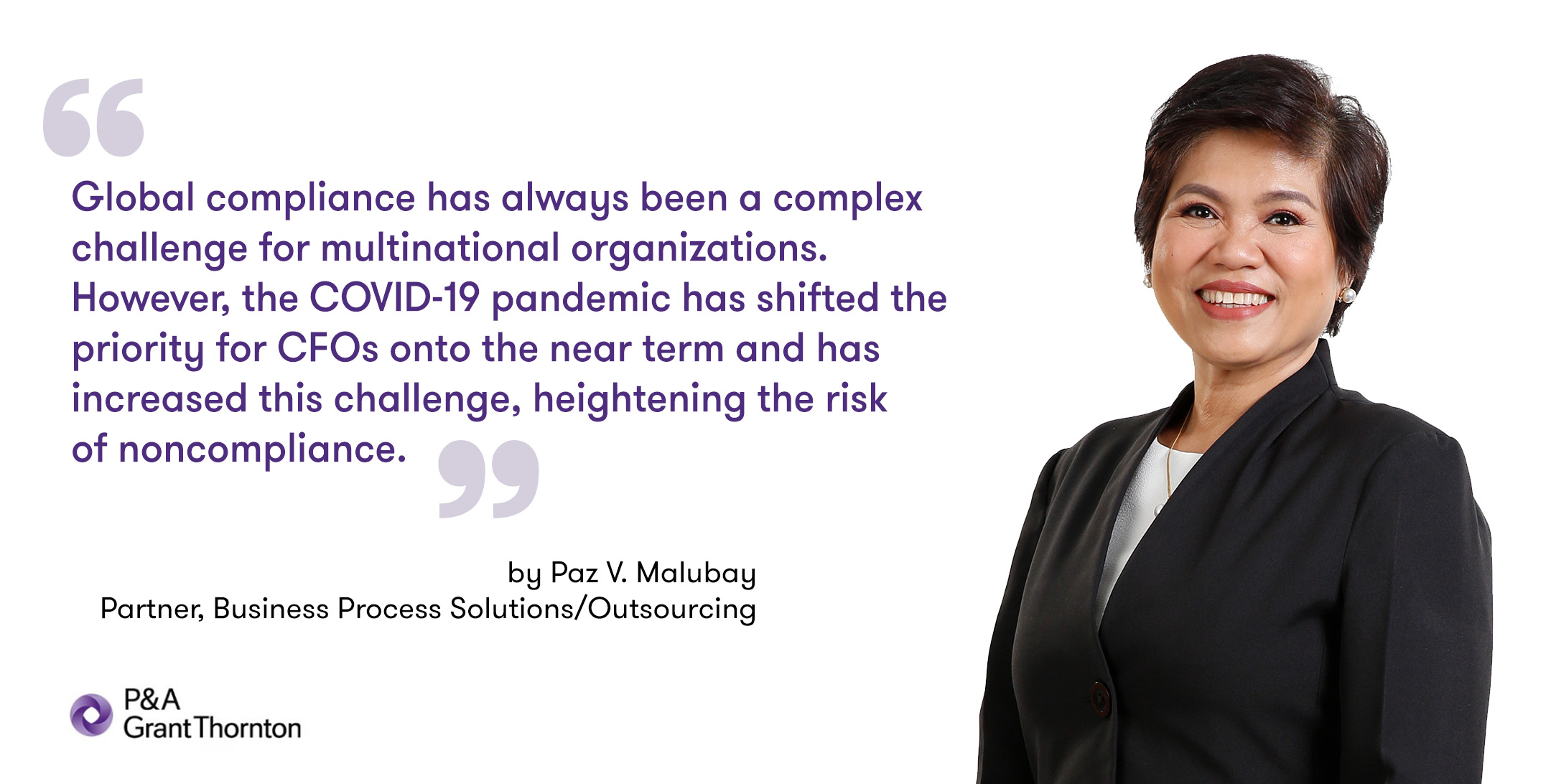Responding to COVID-19 has knocked global compliance issues down the agenda exposing multinationals to further risk. By reviewing the management of compliance obligations and the role of outsourcing, you can reduce risk and retain focus on core operations.
Global compliance has always presented a complex challenge for the finance teams of multi-national organisations operating in many territories. Local laws, regulations and other domestic specialities make compliance a risky headache. But, for many finance and compliance teams, the global pandemic has increased the challenge of doing business in multiple jurisdictions, heightening the risk of non-compliance risk. The crisis has shifted the priority for chief financial officers (CFO) and chief accounting officers (CAO) onto the near-term – keeping operations going by enabling and adjusting to a remote working environment and carefully managing cashflow.
 Tony Thornbury, head of global compliance and reporting solutions for Grant Thornton and based in Dublin, senses that meeting these requirements is proving increasingly difficult: "Business continuity is the priority. The speed with which the global pandemic arrived forced businesses into remote working environments quickly, and the primary focus of multinationals has been keeping the show on the road."
Tony Thornbury, head of global compliance and reporting solutions for Grant Thornton and based in Dublin, senses that meeting these requirements is proving increasingly difficult: "Business continuity is the priority. The speed with which the global pandemic arrived forced businesses into remote working environments quickly, and the primary focus of multinationals has been keeping the show on the road."
But the compliance risk is still very much alive. “That hasn’t diminished,” Thornbury says. “In a time of competing priorities, global compliance issues may have been pushed down the list, but the risk of not complying in each country remains. And a lack of attention and adherence to the local requirements raises tax issues, fines and even director prosecutions. You may also face risk to your brand and reputation in those local markets too.”
The activities that may have been immediately de-prioritised in the wake of the pandemic are broad and bear various weight and significance across different jurisdictions. They include local GAAP filing, tax returns for local statutory reporting, sales tax compliance (VAT, GFC etc.), payroll administration, local country filings and myriad statistical returns depending on the territory.
Thornbury says: "Payroll is a particularly acute area at the moment. The speed with which government implemented complex mechanisms to support payroll systems and reduce unemployment posed a big challenge for compliance. These programmes have been pretty varied across different countries."
In these challenging times, with increasing pain points for compliance teams, CFOs and CAO are asking if the structures that they currently have in place are as efficient or as robust as they could be.
Compliance is an enduring challenge
Ordinarily, for large corporates operating out of the US, GAAP reporting is the compliance function’s primary concern, while global compliance, although an essential legal requirement, is a secondary issue that follows.
Even at the best of times managing compliance is complicated and can distract business leaders from the core business operations. On top of the regulations in individual jurisdictions organisations face wider complexity including different languages, time zones, and multiple professional services firms in different countries supporting primary reporting, corporate tax and sales tax. “Managing the myriad of issues with multiple suppliers is a headache,” says Thornbury, “especially if you’re dealing with 50 or 60 countries with maybe 30 or 40 different local suppliers.”
From an accounting technology perspective, multinationals often report their core countries on consistent Enterprise Resource Planning (ERP) systems, such as SAP or Oracle, across their leading markets. But sometimes it doesn’t make financial sense to implement the same ERP system in countries where the business is less established, and a local service provider uses a different financial reporting system. However, the greater the disconnect in the systems and underlying infrastructure, the more risk there is when trying to bridge a gap between the primary and secondary reporting infrastructures.
This risk has been heightened by an environment of remote working. A disparate workforce accessing diverse systems creates both cyber security risk as well as a headache for compliance consistency.
By reconsidering how they manage their global compliance obligations more efficiently, businesses can mitigate the risk and return focus to core operations, critical at this time.
Acquisitions multiply compliance complexity
Businesses bedding in following recent international acquisitions before the pandemic may be struggling even more with group structures which in multiple jurisdictions. There are several things to consider, following a recent acquisition, including establishing a stable support function and back-office services.
Thornbury says: “When we started working with a market leading global internet service provider, they had acquired four major acquisitions in the past two or three years. Their group structure was massively complex, and they held multiple entities in each jurisdiction; so you might have four or five in France, Germany and as you went into Asia Pacific and Latin America, it was replicated there too.”
Simplification became an essential objective. “But it takes time, and to get to a position where you can do simplification you have to have everything under control. You have to have to be up to date in your filing.”
Another challenge following acquisitions is managing the number of service providers gathered through the process. Each acquisition has a layer of service providers which make compliance more complicated. There is a risk in such instances that audit and filing deadlines get missed, and overruns and fines mount up.
Are you ready to outsource compliance?
For businesses looking to outsource their global compliance function, the more consistency they already have in their reporting processes, the simpler it becomes to engage any service provider, particularly one service provider in multiple jurisdictions.
Thornbury says: “If you have a consistent process around the bridge between your US GAAP reporting and your local GAAP reporting, and a similarly consistent process and pulling your corporation tax return out of that it helps. And the more consistency you have across your jurisdictions, country-by-country, the more it lends itself to having an efficient solution from a compliance point of view. The more variants you have in those processes, the more inefficient it becomes.”
Too often, global compliance is an afterthought that does not get prioritised because it is not the primary function of reporting. Because it is not anybody’s prime job, it easily gets ignored. However, if there is chaos going on in the background, that can be extremely expensive and time-consuming to put right. When businesses start getting significant fines from tax people and local reputations are on the line, global compliance rises sharply up the Boardroom agenda.
Businesses have the option to remove the pain of compliance by centralising processes and handing management to a dedicated specialist with access to a network of local experts allowing flexibility across your territories at a time of unprecedented change.
- Have you identified the weak or high-risk areas in your global compliance framework?
- Do you have multiple service providers creating control challenges and inefficiencies?
- Do you have sufficient time, skills, knowledge and resources available within your network to manage an efficient centralised global compliance function?
- Do you have a consistent process around the bridge between your US GAAP reporting and your local GAAP reporting?
- Do you have visibility of all the compliance and reporting deadlines across your territories and can you monitor these on a real time basis?
- What is your strategy for further international growth? Will your compliance partner have knowledge of the potential jurisdictions you plan to move into?
- Do you have a compliance partner with the appropriate governance structures, KPIs, shared systems, and communications frameworks in place to ensure all your global compliances risks are adequately mitigated.


